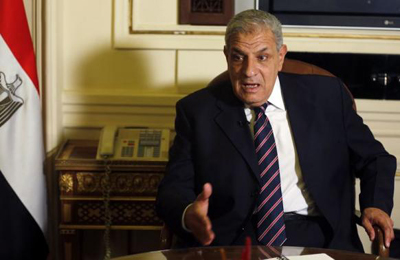
Mehleb...citizens should not expect instant results
Egypt will fix economy but don't expect miracles: PM
CAIRO, October 21, 2014
Egypt's Prime Minister urged the country's citizens not to expect instant results from large-scale infrastructure projects the government has embarked on to create jobs and strengthen the economy.
Ibrahim Mehleb faces the monumental task of repairing finances battered by political upheaval, street protests and Islamist militant violence.
He also has to persuade foreign companies that their cash will be safe in a country where complex laws, legal cases and stifling bureaucracy have entangled or scared away even the most adventurous investors.
In another development, a government minister said that Egypt will be introducing two new cash benefits early next year as part of government efforts to minimise the impact of subsidy cuts on the poor.
President Abdel Fattah al-Sisi's government raised fuel prices by up to 78 per cent shortly after he took office in June - a step that his predecessors had shunned for fear of sparking unrest in a country where millions live in extreme poverty.
The price hikes were accompanied by a patchwork of relief measures including free transport in army buses to offset increases in the cost of public transport.
But the government will have to offer the hardest hit Egyptians more help, like the new cash transfers, if it is to successfully implement the next phase of subsidy cuts to reduce a budget deficit that exceeds 10 per cent of GDP.
In an interview for the Reuters Middle East Investment Summit, Minister of Social Solidarity Ghada Wali said the initial phase of the two schemes would target about 2 million people in Upper Egypt, the impoverished rural south of the country, at an initial cost of 2.5 billion Egyptian pounds ($350 million).
"We hope to start sometime end of November, early December registering newcomers to the programme," she said, with the first payments available a few weeks later.
During an interview for the Reuters Middle East Investment Summit, Mehleb and several of his ministers seem more candid about the economic and social challenges in the biggest Arab country than past governments.
Previous administrations made big promises and rarely delivered, and discontent with these actions eventually helped lead to mass protests in 2011 that toppled veteran autocrat Hosni Mubarak.
Asked why there seemed to be a shift, Mehleb said: "Because the rosy picture did not produce a result".
He is offering no quick fixes and acknowledges that it may be some time before Egyptians benefit from highly ambitious ventures, even though some progress had been made on issues such as reducing bread lines.
"The Egyptian people still have not felt it because there are problems in water, in medical care, in health, education," he said.
Patience is key, he added. "The effect (of projects) will not be today, it's impact will be next year."
The stakes are high, especially since Egyptians have heard it all before and have proven through street protests they are ready to take on their leaders -- although the craving for stability seems to be framing the mood on the street these days.
After then army chief Abdel Fattah al-Sisi toppled President Mohamed Mursi of the Muslim Brotherhood last year, security forces mounted one of the fiercest crackdowns against Islamists, killing about 1,000 in the streets and arresting thousands.
Many Egyptians, who staged mass protests against Mursi's rule, put up with what rights groups described as widespread human rights abuses, hoping that Sisi would stabilise Egypt after the turmoil that followed Mubarak's fall.
Now that political tensions have eased, Egyptians are bound to more closely scrutinise Mehleb's performance on the economy, job creation and housing, some of the issues that triggered the Tahrir Square protests that ended Mubarak's long rule.
Ratings agency Moody's on Monday changed its outlook on Egypt to stable from negative, citing a stabilised political and security situation. But it affirmed its Caa1 government bond rating which it said was constrained by high government debt and fiscal deficits and large fiscal borrowing needs.
Mehleb said the key to success was mega projects like a new Suez Canal Egypt hopes will more than double revenues from the waterway by 2023 to $13.5 billion from $5 billion.
It also plans to develop 76,000 sq km in the area into an international industrial and logistics hub to attract more ships and generate income.
The new canal is to be built alongside the existing 145-year-old waterway which is the fastest shipping route between Europe and Asia.
Authorities said Egyptians poured the equivalent of $8.5 billion into investment certificates to help fund the project.
"Maybe the biggest project is the Suez Canal. The answer was very clear that the financier of this project was the Egyptian people," Mehleb said.
He also highlighted a project costing the state E£34 billion ($4.76 billion) designed to pave 3,400 km of roads that his administration hopes will boost development.
"Without these projects there will be no development," Mehleb said.
Reflecting on what keeps him awake at night, Mehleb pointed to unemployment officially estimated at about 13 per cent.
Along with mega-projects are high-profile business meetings the government hopes will project a new image of an Egypt that is serious about removing deep-rooted barriers to investment.
An economic summit aimed at encouraging international investment in Egypt will be held on February 21, 2015 in the resort town of Sharm El-Sheikh.
Officials have said Egypt will present more mega-projects worth billions of dollars.
He said energy projects would figure prominently into sales pitches at the conference, underscoring what could be a make-or-break issue for the government -- power cuts.
Electricity cuts were one of the main sources of public anger against Mursi during his turbulent year in office.
Sisi's decision to ease fuel subsidies that severely drained the state budget signalled he may be more serious about economic reforms than past Egyptian leaders who feared a political backlash. - Reuters







